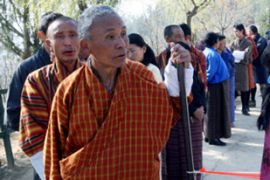Landslide win for Bhutan royalists
Poll comes after monarch urges reluctant populace to move away from royal rule.

Final results are expected on Tuesday.
No enthusiasm
Reporting from Bhutan‘s capital, Thimpu, Al Jazeera correspondent Tony Birtley said that despite the royal seal of approval, many Bhutanese were not enthusiastic about democracy.
He said: “People here don’t want democracy. They are happy with the monarchy.
“The public discontent with the monarchy in Nepal may have prompted the king to decide that it may be time to move ahead and embrace modernity.”
The introduction of democracy is designed to ensure the continued popularity of Bhutanese monarchy and avoid a repeat of unrest that shook the nearby kingdom of Nepal two years ago.
A popular revolt in Nepal in April 2006 forced King Gyanendra from power and stripped away his wide-ranging regal powers.
Monarch appeal
| Bhutan votes |
|
Sandwiched between India and China, Bhutan is known by its people as Druk Yul, the Land of the Thunder Dragon
Election sees 318,465 voters eligible to vote in 47 constituencies
Only two parties allowed to contest elections: The People’s Democratic Party promises “service with humility” while the Druk Phuensum Tshogpa says it stands for “growth with equity and justice”
In January and December voters elected 20 members of a 25-member National Council meant to act as an upper house of parliament. Five remaining members are chosen by the king |
King Jigme Khesar Namgyel Wangchuck, the leader of Bhutan, had called for a large turnout and urged voters to choose between two markedly similar parties.
“First and foremost, you must vote. Every single person must exercise his or her franchise,” the king said in a statement published in the nation’s newspapers.
Voters chose members of a national assembly, or lower house of the parliament, in the election, which was declared a national holiday.
Bhutan‘s transformation towards a democratic constitutional monarchy was started by the Jigme Singye Wangchuck, the former king of Bhutan.
He handed over daily administration to a council of ministers in 2001, before stepping down in December 2006.
Both the PDP and the DPT fielded candidates that served as prime ministers under royal rule.
The PDP’s main election slogan was for the “wellbeing of everyone”, while the DPT said it was committed to “growth with equity and justice”.
Both promoted Gross National Happiness (GNH), the king’s all-encompassing political philosophy that seeks to balance material progress with spiritual wellbeing.
The isolated kingdom has remained wary of embracing the consumerist trappings of the modern world, only allowing the entry of the internet and television in 1999.